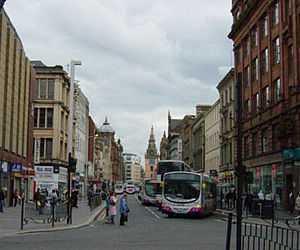Trongate
Trongate is one of the oldest streets in the city of Glasgow, Scotland.

Located in the area of the Merchant City commonly known as "Old Glasgow", it is the main route into the central area from the East End. Trongate begins at Glasgow Cross, the original centre of medieval Glasgow, marked by the Tolbooth clock tower, the remains of the city's original City Chambers destroyed in 1926 by fire. Westward, it becomes Argyle Street, the most southerly stretch of Glasgow's "Golden Z" shopping thoroughfare.
It was around the 1560s that the name Trongate first began to be used. The name comes by virtue of a weighbeam erected in the mid-16th century, where all goods that were brought in from the Clyde were weighed and taxed. Tron was a Scots word of Norman origin for weighing scales.
The Tron church (built in the 17th century), with its distinctive steeple and clock, is the street's best known landmark. It was substantially redeveloped in the 1980s as the Tron Theatre. Historically, in line with the rest of Glasgow's medieval area, Trongate fell into decline following the Industrial Revolution as the city expanded westwards, and even today, there are still many derelict buildings and half-closed shops.
In line with the rest of the Merchant City, the area has undergone a renaissance since the 1990s, with new bars, restaurants and upmarket apartment blocks being built from the old Victorian buildings. The London-based retailer Selfridges acquired the former Goldbergs site on the corner of Trongate and Candleriggs to build a new department store that promised to revamp the area significantly. However, progress stalled indefinitely after the sale of Selfridges to a businessman from Canada, Galen Weston, in 2003, who intended to revamp Selfridge's flagship Oxford Street store rather than open in Glasgow and other cities such as Newcastle-upon-Tyne, Leeds and Bristol. As of August 2012, much of the northern side of the street remains semi-derelict.